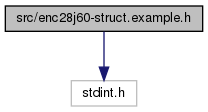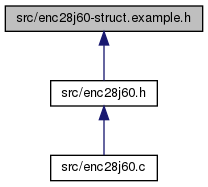Part of enc28j60 driver. More...
#include <stdint.h>

Go to the source code of this file.
Classes | |
| struct | enc28j60 |
| Structure holding important informations about enc28j60 and about the latest transmission performed. More... | |
Macros | |
| #define | ENC28J60_ERROR_TOO_MANY_COLLISIONS -0x900 |
| Error code indicating that max number of retries were performed and we were still unable to transmit the frame. More... | |
| #define | ENC28J60_ERROR_RX_TIMED_OUT -0x901 |
| Error code indicating that we timed out while waiting for a packet in enc28j60_receiveframeblocking(). More... | |
| #define | ENC28J60_TIMER_TICK_PER_SECOND 1000 |
| How many ticks are there per second. More... | |
| #define | ENC28J60_CALC_REMAINING_TICKS(GOAL, CUR) ((int16_t) (GOAL) - (int16_t) (CUR)) |
| Calculate how many ticks are remaining. More... | |
Typedefs | |
| typedef uint16_t | enc28j60_tick |
| TODO: Change it to uint32_t or uint8_t, depending on the timer resolution. More... | |
Functions | |
| int | enc28j60_spi_advanced_transfer (enc28j60 *instance, const char *tx1, char *rx1, unsigned length1, const char *tx2, char *rx2, unsigned length2, enc28j60_spi_callback on_finish) |
| This function performs (using DMA or blocking I/O) parallely transmision from 'tx1' buffer and reception into 'rx1' buffer (if 'rx1' is not null), and once this transmission is completed, performs transmission from 'tx2' (if not null) into 'rx2' (if not null). More... | |
| int | enc28j60_spi_transfer_join (enc28j60 *instance) |
| This function should wait until SPI operation in progress (if any) finishes and then return. More... | |
| bool | enc28j60_spi_error_handler (enc28j60 *instance, int error_code, uint16_t retry) |
| This function is called before callback when non-zero error code is received from enc28j60_spi_transfer() or enc28j60_spi_advanced_transfer(). More... | |
| int | enc28j60_delay (enc28j60 *ins, enc28j60_tick ticks) |
| Wait until given number of ticks passes. More... | |
| int | enc28j60_getticks (enc28j60 *ins, enc28j60_tick *ticks) |
| Get current number of ticks. More... | |
Detailed Description
Part of enc28j60 driver.
- Version
- 1.0
- Date
- 2020-05-01
- Copyright
- Copyright (c) 2020 Dalibor Drgon dalibor.drgon@gmail.com This code is licensed under MIT license (see LICENSE.txt for details)
Macro Definition Documentation
◆ ENC28J60_ERROR_TOO_MANY_COLLISIONS
| #define ENC28J60_ERROR_TOO_MANY_COLLISIONS -0x900 |
Error code indicating that max number of retries were performed and we were still unable to transmit the frame.
TODO: Change its value if such value for error code is already used.
◆ ENC28J60_ERROR_RX_TIMED_OUT
| #define ENC28J60_ERROR_RX_TIMED_OUT -0x901 |
Error code indicating that we timed out while waiting for a packet in enc28j60_receiveframeblocking().
TODO: Change its value if such value for error code is already used.
◆ ENC28J60_TIMER_TICK_PER_SECOND
| #define ENC28J60_TIMER_TICK_PER_SECOND 1000 |
How many ticks are there per second.
NOTE: This should be at least 1 millisecond to quarantee best performance, but even for less precise timers than that the functionality is preserved.
◆ ENC28J60_CALC_REMAINING_TICKS
| #define ENC28J60_CALC_REMAINING_TICKS | ( | GOAL, | |
| CUR | |||
| ) | ((int16_t) (GOAL) - (int16_t) (CUR)) |
Calculate how many ticks are remaining.
NOTE: The data type returned should be signed.
Typedef Documentation
◆ enc28j60_tick
| typedef uint16_t enc28j60_tick |
TODO: Change it to uint32_t or uint8_t, depending on the timer resolution.
This data type has to cover 1 millisecond.
NOTE: The code (ENC28J60_CALC_REMAINING_TICKS macro) assumes that the timer resets when it hits 0b1111...1111. If your timer does work differently, you may need to modify ENC28J60_CALC_REMAINING_TICKS.
Function Documentation
◆ enc28j60_spi_advanced_transfer()
| int enc28j60_spi_advanced_transfer | ( | enc28j60 * | instance, |
| const char * | tx1, | ||
| char * | rx1, | ||
| unsigned | length1, | ||
| const char * | tx2, | ||
| char * | rx2, | ||
| unsigned | length2, | ||
| enc28j60_spi_callback | on_finish | ||
| ) |
This function performs (using DMA or blocking I/O) parallely transmision from 'tx1' buffer and reception into 'rx1' buffer (if 'rx1' is not null), and once this transmission is completed, performs transmission from 'tx2' (if not null) into 'rx2' (if not null).
If 'tx2' and 'rx2' is null (that is, when 'length2' is zero), the arguments 'tx2' and 'rx2' should be ignored and only repcetion from/into 'tx1'/'rx1' (if not null) should be done. If the callback is null, this function must block and return the error code, otherwise it may or may not block and the error code should be passed to the callback (and 0 returned).
NOTE: You must implement this function.
- Parameters
-
instance Pointer to enc28j60 struct (may contain hardware/software specific fields to determine which SPI to use). tx1 Pointer pointing to data for transmission. Will not be null. rx1 Pointer pointing to memory where data sohuld be received. May be null, in which case received data may be ignored. May also be same as 'tx'. length1 Length of 'tx1' (and length of 'rx1' if 'rx1' is not null). tx2 Pointer pointing to data for transmission. May be null. rx2 Pointer pointing to memory where data sohuld be received. May be null, in which case received data may be ignored. May also be same as 'tx'. length2 Length of 'tx2' (if 'tx2' is not null) and length of 'rx2' (if 'rx2' is not null). on_finish Callback which should be called when transfer is completed. If callback is null, the function must block and return error code, otherwise if callback is supplied the function may or may not block and callback must be called (with error code as parameter) and zero must be returned.
- Returns
- int error code, or 0 on success (return 0 when callback is supplied)
◆ enc28j60_spi_transfer_join()
| int enc28j60_spi_transfer_join | ( | enc28j60 * | instance | ) |
This function should wait until SPI operation in progress (if any) finishes and then return.
NOTE: You must implement this function.
- Returns
- Error code or 0 on success.
◆ enc28j60_spi_error_handler()
| bool enc28j60_spi_error_handler | ( | enc28j60 * | instance, |
| int | error_code, | ||
| uint16_t | retry | ||
| ) |
This function is called before callback when non-zero error code is received from enc28j60_spi_transfer() or enc28j60_spi_advanced_transfer().
It tells whenever we should retry the transmission (by returning true), or simply fail and return the error code to the user (by returning false).
What exactly will this function do is dependant on the user. It may as well block infinitely and print error message on the screen, or always return true to retry the transmission if it's safe to do so.
NOTE: You must implement this function.
- Parameters
-
instance Pointer to enc28j60 struct error_code Non-zero error code received from enc28j60_spi_transfer() or enc28j60_spi_advanced_transfer() retry How many retries were there total (starting from 1).
- Returns
- bool true if tranmission should be retried, false if error should be returned/passed to a callback.
◆ enc28j60_delay()
| int enc28j60_delay | ( | enc28j60 * | ins, |
| enc28j60_tick | ticks | ||
| ) |
Wait until given number of ticks passes.
- Parameters
-
ins Pointer to initialized enc28j60 struct. ticks How many ticks this function should wait before returning.
- Returns
- int Error code or 0 on success.
◆ enc28j60_getticks()
| int enc28j60_getticks | ( | enc28j60 * | ins, |
| enc28j60_tick * | ticks | ||
| ) |
Get current number of ticks.
- Parameters
-
ins Pointer to initialized enc28j60 struct. ticks If not null, there should be stored the number of ticks.
- Returns
- int Error code or 0 on success.
 1.8.13
1.8.13